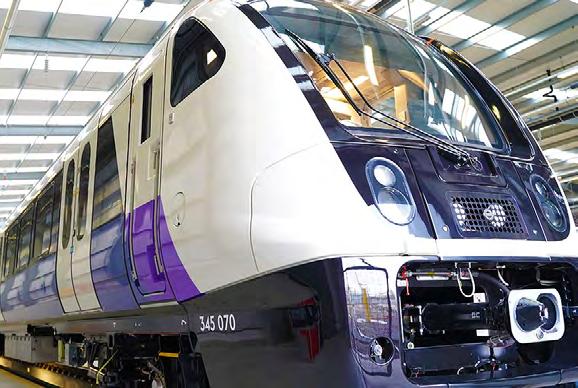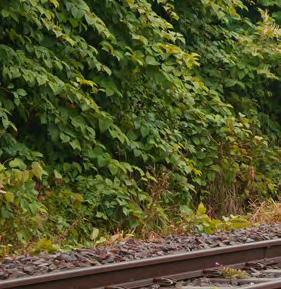
7 minute read
Crossrail back on track
Funding and financing package for the final phase of Crossrail project agreed
Transport for London says the £825 million loan allows work to carry on “at pace” to open the new railway in 2022
An £825 million funding and financing package has been agreed for the final phase of the Crossrail project.
The Mayor of London, Transport for London (TfL), the Department for Transport (DfT) and HM Treasury announced the news earlier this month.
Crossrail Ltd announced in August that it expected the Elizabeth line to open through central London in the first half of 2022 and that they would require funding beyond the agreed funding envelope.
Andy Byford, London’s Transport Commissioner, said: “I have been very clear that it is my priority to get the railway open as soon as possible and all those working on the Crossrail project are focused on that too.
“Confirming this financing is an essential step in ensuring the team can fully concentrate on safely delivering the Elizabeth line, which is so vital for boosting rail capacity and supporting the economy.”
The shortfall will initially be covered by the Greater London Authority (GLA) borrowing up to £825 million from the DfT, which will be given by GLA to TfL as a grant. The GLA will repay this loan from Business Rate Supplement (BRS) and Mayoral Community Infrastructure Levy (MCIL) revenues.
The Mayor of London, Sadiq Khan, said: “Securing this financing package enables us to press full steam ahead with getting the central section of the Elizabeth line open as soon as possible. I do not want this project to be stalled so it is vital that we dig deep to get the railway up and running.
“I will continue to monitor progress closely and do everything I can to minimise costs – helping ensure London and beyond can enjoy its many benefits sooner rather than later.”
Governance of Crossrail transferred directly to TfL in October, with a special purpose committee of the TfL Board, the Elizabeth Line Committee, providing high-level oversight of the project.
Mark Wild, Chief Executive of Crossrail Ltd, said: “Delivery of the Elizabeth line is now in its complex final stages.
“Good progress continues to be made with completing the remaining infrastructure works so that we begin intensive operational testing, known as Trial Running, at the earliest opportunity in 2021.
“Many of the stations are now nearing completion and we will shortly commence an enabling phase for Trial Running which allows testing in the tunnels to be undertaken with an increased number of trains, further helping to build operational reliability.”
When fully open, the Elizabeth line will increase central London’s rail capacity by 10 per cent, able to carry more than half a million passengers per day and will support new journeys through central London out to Essex and Berkshire.
The new railway is expected to support thousands of new homes and new jobs and is estimated to boost the UK economy by £42 billion.


The Victorians were certainly visionary in creating the highways, railways and infrastructure that makes up our transport system, but little did they know that when they planted Japanese Knotweed to stabilise the banks they would be causing so many problems for the future.
With at least one reported infestation of Japanese Knotweed in every 10 square kilometres in the UK, Japanese Knotweed really is a growing problem – pun intended. However, Japanese Knotweed isn’t the only invasive species that can cause issues: Giant Hogweed, Himalayan Balsam, Rhododendron and Buddleia (to name just a few) can compromise structures, cause land erosion and, in the case of Giant Hogweed, pose a serious health risk if a person comes into contact with it.
Delivering excellence Three Shires Limited has serviced the rail industry for many years; from being a Principal Contractor to Network Rail through to working in partnership with other contractors to help deliver railway specific work, nationwide.
As well as providing eradication solutions, the experienced team carry out Japanese Knotweed and invasive weed site surveys, produce detailed invasive weed reports, as well as precautionary methods of working and Japanese Knotweed management plans.
For many large construction clients, Three Shires can provide Japanese Knotweed clerk of works services; this allows customers to use their on-site plant and resources under qualified and experienced instruction to deliver the remediation works. This reduces cost whilst maintaining best practice and compliance with legislation.
Situated across four offices, Three Shires can offer resources nationwide from a small project to larger contracts, whether this be labour only or a complete, managed solution. Three Shires has the knowledge and expertise to help facilitate your requirements; their track record shows that they deliver and do make a difference.

Environmental excellence in the rail sector One of the benefits of working with Three Shires is their experienced Ecology team. They can help you to understand the potential impacts of your project, advising on ecological opportunities and constraints to support your development proposals and translate it onto the ground.
Three Shires specialises in single point provision of ecological consultancy in parallel with the physical delivery by in-house staff of physical site works, ranging from vegetation clearance, fencing works, minor civils works and invasive weed eradication. Three Shires can offer a full turnkey solution, supplying all necessary safety-critical staff and SSOWs planning.
Another benefit is the ability to deliver within critical timeframes to avoid seasonal complications or constraints which can have serious implications in terms of time and money.
Three Shires is one of the very few companies that can provide clients with a 360º service in all matters relating to ecology and site preparation, understanding protected species legislation and knowing of the financial and timing impacts that they can have on your project.
Ecological works are characteristically last- minute and notoriously difficult to programme – teams need to be deployed quickly and deliver market-leading outputs from day one. Finding solutions to ecological site constraints is about using extensive ecological knowledge to innovate. With experience of hundreds of licenced ecological schemes, in all sectors of the industry, no other contractor can do more to move your project forward.

360º service Expert chainsaw operatives, tree surgeons and plant operators enable Three Shires to set unrivalled standards in arboriculture and vegetation clearance. All teams are City and Guilds NPTC qualified to the highest level in all aspects of chainsaw operations and tree surgery techniques.
All plant and equipment are rigorously inspected and maintained as part of the
Three Shires Health and Safety Management System. MEWPS and mobile lifting platforms bring additional safety and control where required, again with fully certified and experienced operators.
Employing the latest methods and technology, Three Shires offers a comprehensive suite of environmental landscaping services to the Rail Industry. Having undertaken many large contracts over the years, Three Shires offers advice and services to some of the most complex and sensitive projects, working alongside clients to deliver cost-effective and timely solutions. Three Shires are also experienced installers in the rail industry, with more than 50km of fencing installed across the Rail Network in recent months. By investing in labour-saving machinery, retaining some of the best fencers in the industry and maintaining quality regardless of project size, it continues to grow its fencing department year on year.
Three Shires is one of the UK’s leading environmental, fencing and arboriculture contractors to the rail sector. Working alongside some of the largest main contractors and train operators in the industry, Three Shires delivers an integrated suite of environmental, fencing, arboriculture, vegetation clearance, roped access and invasive weed solutions.
Three Shires is an RISQ approved contractor with in-house staff qualifications comprising of PTS, COSS, Engineering Supervisor and Safe System of Work Planners. In addition to their rail- specific accreditations, staff also hold industry relevant degrees and BTEC ND/HND Forestry qualifications, CSCS, CITB, SMSTS, SSSTS, First Aid, ROLO, BESC and IOSH Managing Safely, NEBOSH, ISO 9001, ISO14001 and (BS) OHAS 18001. Three Shires is industry skilled “I would like to say thank you to you and your team for the great effort over the weekend for the Japanese Knotweed treatment. We were very impressed with the very quick turnaround. A successful weekend’s work. Thank you.” J. Murphy & Sons


and qualified, health and safety aware, and track ready. Focused on delivering cutting edge techniques to meet the diverse site requirements encountered on the rail infrastructure enables Three Shires to move projects forward, delivering on time and on budget.










